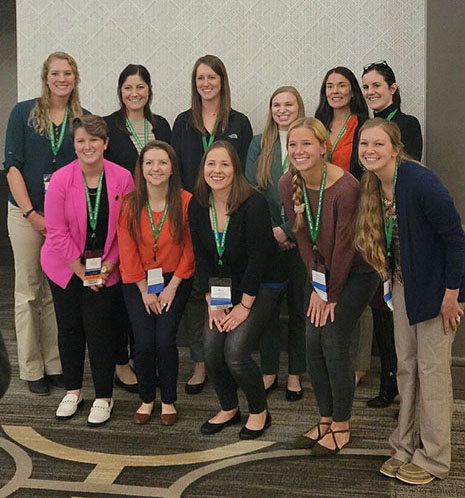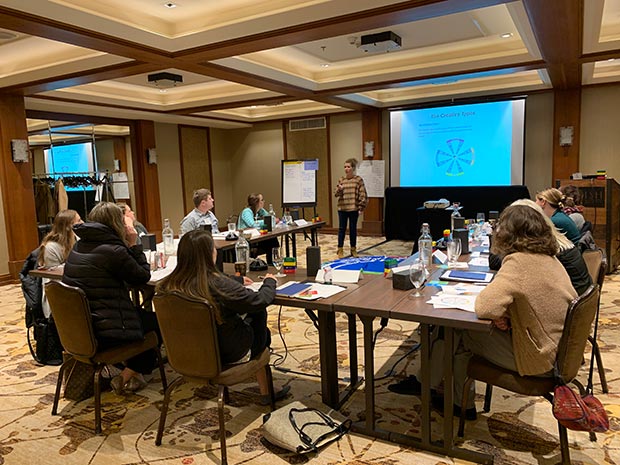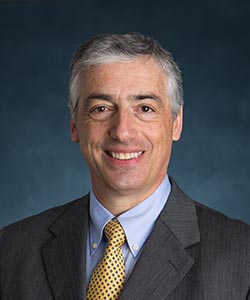
Leadership development programs offer advantages in and out of the clinic
Several leadership development programs in the veterinary profession aim to improve leadership skills and give participants a professional edge. From postgraduate programs to veterinary conferences, there are countless options for developing valuable abilities.
AVMA News spoke with some of the people who have organized and participated in these programs about their benefits and why soft skills are always in demand.
Power of 10
The Power of 10 program broadens the knowledge of young veterinarians by using classroom and experiential learning. Dozens of state VMAs have adopted the Power of 10 program, which is meant to develop foundational skills in leadership, communications, and business.
This leadership opportunity offers in-person and virtual program sessions, which provide continuing education credits. Every year, each program selects 10 veterinarians from varying backgrounds who have less than seven years of postgraduate experience.
Dr. Sarah Wright is one of the participants selected for the Illinois State VMA’s Power of 10 class of 2022-23.

The members of the group completed a personality survey at their first meetup of the year to explore how different personality types work with one another, said Dr. Wright, who is social media editor for the AVMA Journals. On the second day, the group had a workshop on communicating with difficult clients.
The group members are learning how to best make their voices heard in veterinary medicine, and additional communications training helps to achieve that goal.
Dr. Wright said the Power of 10 program benefits participants not only professionally but also personally. The free CE and the opportunity to network are beneficial, she said, as well as gaining leadership skills. Developing her emotional intelligence has allowed her to have interactions with co-workers, family, and friends that are more positive.
Dr. Lindsey Hornickel, an assistant director in the AVMA Government Relations Division, was in the inaugural Power of 10 classes for the Minnesota VMA and the Washington State VMA. She later became the curriculum coach for the WSVMA’s program along with Candace Joy, CEO of the WSVMA.
“The communication and leadership training I received through these programs has absolutely positively impacted my professional and personal life,” Dr. Hornickel said. “I was in clinical practice at the time of my participation in the Power of 10 programs and definitely felt nervous to add another responsibility to my plate, but the time invested in these programs has paid itself back in spades.”
The Washington State VMA’s program has four learning modules each year in personal development, communications, leadership, and how to make a difference in the profession. The program includes taking a trip to the state capitol, talking to legislators, and meeting the WSVMA board of directors, the state veterinarian, the state public health veterinarian, and AVMA House of Delegates members.
Participants also meet during the year to produce a project of their own design to develop additional knowledge on a topic of their choice or to build on a desire to make a difference, Joy said.

“Veterinary medicine can be a demanding career, and it can clash with the healing, empathic nature of veterinarians,” she said. “Developing the soft skills can help them establish a strong foundation with which to gain more satisfaction in their careers and personal lives.”
Joy explains that program participants learn how to feel more comfortable with themselves and others, develop greater resilience, communicate more effectively, and gain the confidence to expand their horizons, whether in veterinary medicine, their family, or their community. Participants form bonds with one another that last long after the year has ended.
“I’ve had numerous graduates make exciting career moves they said they never would have had the confidence to make if they hadn’t gone through the program,” Joy said.
She said, “Even when someone feels stressed and that they can’t add one more thing to their schedule, participating in Power of 10 will help jump-start a healthy life and career, whatever their long-term goals are.”
Genus
The Veterinary Medical Association Executives has more than 130 members and supports VMA executives in providing effective leadership within the veterinary profession.
The VMAE started the Power of 10 program in 2012 with support from Elanco. As with many of the VMAE’s programs, there is a committee to promote the program nationally and assist individual VMAs with customization according to their needs.
Adrian Hochstadt, CEO of the VMAE, noticed participants in the Power of 10 program went on to become leaders in their VMAs, the AVMA House of Delegates, and other roles inside and outside the profession.

Hochstadt explained, “We had a desire to take these concepts from the Power of 10 program and bring them to a much larger audience.”
So the VMAE created Genus, a weekly digital newsletter designed for VMA members. Genus provides content on professional and personal leadership and business development through curated articles in nine categories, including leadership, productivity, well-being, communications, and financial guidance. Each week, relevant news is selected from hundreds of articles.
The VMAE can tailor each newsletter to the group served, with the help of artificial intelligence to learn the preferences of the audience to suggest pertinent content. Both the Independent Veterinary Practitioners Association and the American Animal Hospital Association are using Genus for their members. In addition to work-related articles, there is content focused on strategies and advice for succeeding in daily life. Hochstadt hopes more VMAs will use the newsletter as a member benefit that is easy to implement and economical.
“Smaller VMAS don’t always have the resources to create their own newsletter,” Hochstadt said. “With Genus, they can take what we provide, for a small fee, as a newsletter their members can benefit from.”
An institute, a conference, and an academy
The Veterinary Leadership Institute is a nonprofit organization dedicated to the development of healthy and resilient leaders who can make a positive difference for the profession. VLI has multiple leadership development opportunities, including the Veterinary Leadership Experience and Trek. Both are weeklong, intensive programs based in Post Falls, Idaho, that are aimed at encouraging participants to think outside the box for personal and professional growth.
A study looking at the VLE surveyed 157 veterinary students and 61 veterinary professionals one year after they completed the experience. Participants reported that the program had a high impact on all key knowledge areas: self-awareness, self-management, social awareness, relational competence, communication skills, and conflict management skills.
VLI also works closely with veterinary students and faculty members to design university-based programs that support the development of not only technical skills but also personal leadership and interpersonal skills.
Another leadership development opportunity for both veterinary students and veterinary professionals at every career stage is the AVMA Veterinary Leadership Conference meeting, held annually in Chicago, combines continuing education sessions, AVMA governance meetings, and networking opportunities with diverse colleagues from the veterinary profession.

Attendees range from those with a desire to get involved with the AVMA or other veterinary organizations—and who have little or no prior leadership experience—to experienced leaders who want deeper engagement and opportunities to develop new skills. Scholarships are available for 10 AVMA members every year to develop their leadership potential.
VLC 2023 takes place in person Jan. 5-7, and certain sessions will be available virtually as well. The keynote address, “As We Lead, So We Leave,” on Jan. 6 will touch on the effects that leadership, good and bad, has had on individuals and how leaders can be more intentional in how they opt to lead, knowing that their legacy is a compilation of decisions and interactions—past, present, and future. Six veterinary storytellers, including Dr. Betsy Charles, executive director of the Veterinary Leadership Experience, will share their experiences with the human side of veterinary medicine. The following day will offer a keynote workshop to dive further into the speakers’ insights.
A leadership program more aimed at the academic side of veterinary medicine is the American Association of Veterinary Medical Colleges’ Leadership Academy. Launched in 2012, it seeks to provide leadership development for faculty members and a forum for building connections among faculty members at veterinary colleges and departments around the world.
The AAVMC Leadership Academy is focused on helping develop tomorrow’s leaders of academic veterinary medicine by enhancing real-world leadership competencies.
Opportunities for all
Even without a formal program, veterinary professionals can learn and hone their soft skills at nearly any conference. Dr. Wright suggested that veterinarians consider communication- or leadership-based sessions. More states are starting to include these topics in their CE credit requirements.
Regarding advice for other young professionals, Dr. Wright said: “You should continue to seek opportunities to better yourself. It’s always valuable to adjust your habits and communication styles over time.”
“It’s so important to work on developing soft skills. Even though animals are your patients, people are your clients,” Dr. Wright continued. “If you can better serve your clients, you will ultimately better serve the animal.”